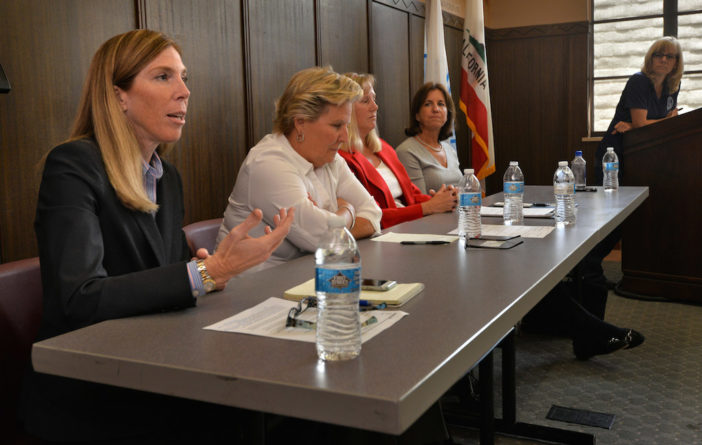The recruit watched from the back, all eyes and ears on the four panelists as they talked about their more than 100 years of combined law enforcement experience.
On Monday, June 8, Danielle Riedl, 22, started attending the Fullerton PD pre-academy, and on July 20 she will enter the Orange County Sheriff’s Regional Training Academy to pursue her dream of becoming a police officer.
On May 21, Riedl gleaned some pre-academy wisdom as an attendee of a panel discussion entitled “Going the Distance” hosted by Women Leaders in Law Enforcement Southern California at the Fullerton PD.
Riedl, a 2011 Mater Dei High School graduate who has worked for more than 3 ½ years as a community service officer at the CSU Fullerton Police Department, called the panel discussion invaluable.
“These women are amazing,” Riedl said. “They offer so much insight and so much experience, especially to someone like myself who is just starting out.
“I could see myself in each one of these women, and will remember what each of them said and apply it to my career,” Riedl said.
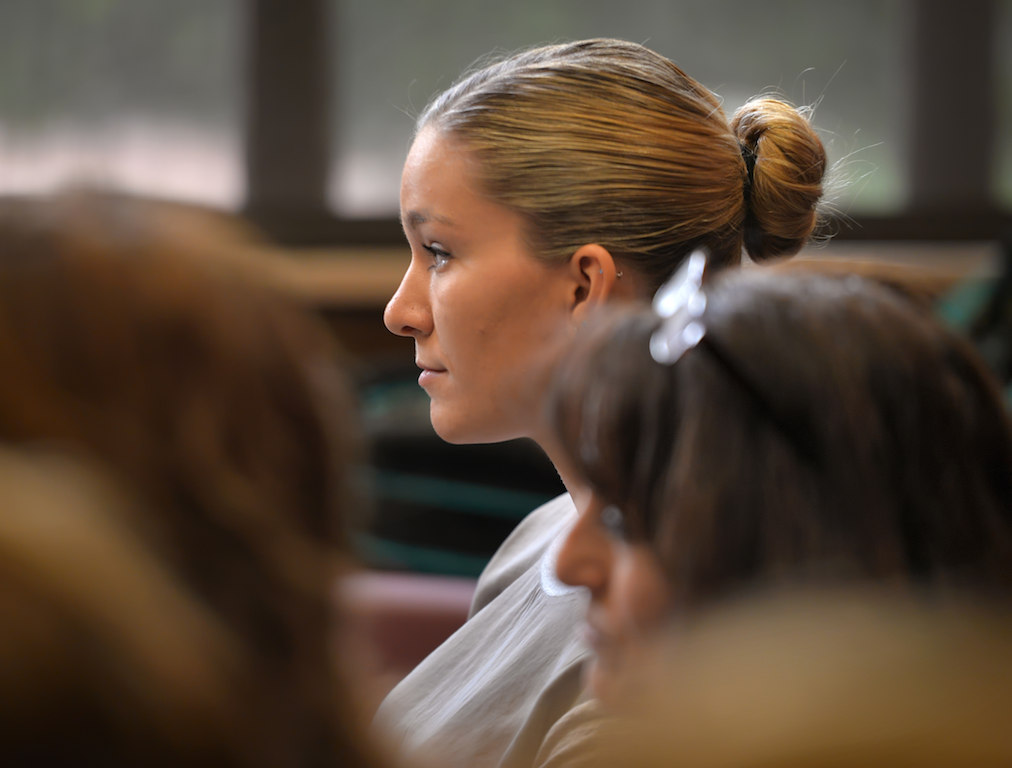
Danielle Riedle, 22, is pursuing her dream of becoming a police officer as a Fullerton PD recruit. Photo: Steven Georges
The panelists — retired Cypress Police Chief Jackie Gomez-Whiteley, retired Newport Beach Police Sgt. Shontel Sherwood, retired Anaheim Police Lt. Sharon Pietrok, and retired Fullerton Police Capt. Lorraine Jones — talked about the importance of mentoring and a wide range of other issues in the hour-long session.
Women Leaders in Law Enforcement So Cal Chairperson Julia Engen, a commander with the Irvine PD, hosted the panel discussion along with Fullerton PD Sgt. Kathryn Hamel, vice chairperson of the SoCal chapter of WLLE, which was formed in 1987 in Palo Alto and holds an annual statewide training symposium.
Gomez-Whiteley and Orange County Sheriff Sandra Hutchens were instrumental in starting a few years ago the So Cal chapter of WLLE, which holds monthly meetings.
In the audience at the May 21 “Going the Distance” panel discussion were members of the Orange County Sheriff’s Department, Irvine PD, Fullerton PD, La Habra PD, LAPD, CSUF PD and the Orange County District Attorney’s Office. Some attendees were from as far way as San Diego and Santa Clarita.
“We have a huge need with retirements coming up to identify our future leaders,” Fullerton PD Capt. Scott Rudisil said in brief comments before the panelists gave recaps of their careers and answered some questions from Engen.
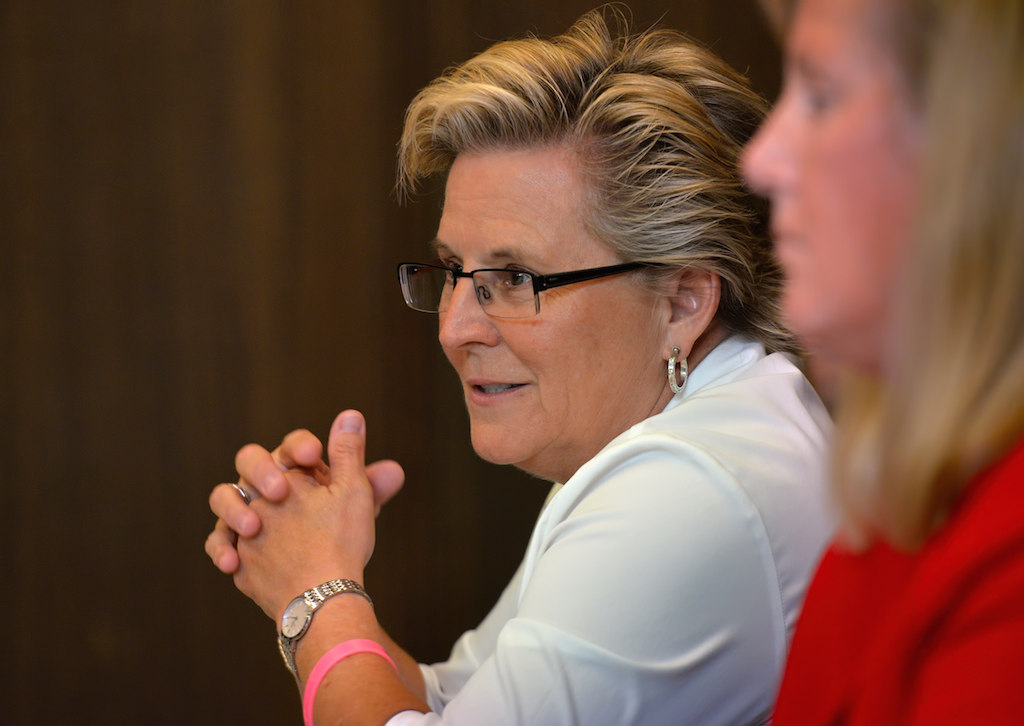
Sharon Pietrok, retired Anaheim Police lieutenant, says mentors can come from all ranks and to take advantage of their wisdom.
Photo by Steven Georges/Behind the Badge OC
Gomez-Whiteley worked for more than two decades at the Orange PD before joining the Cypress PD, where she was chief for four years before retiring early this year.
Sherwood started at the NBPD when she was 24 — the third female to be hired at the agency. She retired in 2013.
Pietrok was a cop with the Anaheim PD for nearly 25 years. She started her career at the relatively mature age of 32 and stressed how important being a detective was to her eventual promotion to lieutenant. She retired April 1 this year.
Jones, a former police cadet, was hired by the FPD at age 21. She didn’t have many female role models and stressed the importance of earning a bachelor’s and master’s degree for advancement. She retired in September 2014.
Here are some excerpts from the panel discussion:
Q. If you could go back in time 20 years and think of one thing you could tell yourself, what would that be?
Sherwood — Having no female role models at my police agency and five different field-training officers, I was watching and emulating men when dealing with the public, and that’s what I thought I was supposed to do. And that got thrown back in my face so many times, because I am not a man. I don’t have the stature or the look. I don’t have their voice. I don’t have the presence. It took a while for me to figure out that I just needed to be me.
You’re got to be you, or the community is not going to be responsive to you. Find what works for you.
Pietrok — It’s going to take about two years to start feeling comfortable in your skin doing this job, because it’s so multi-faceted and involves so much multitasking.
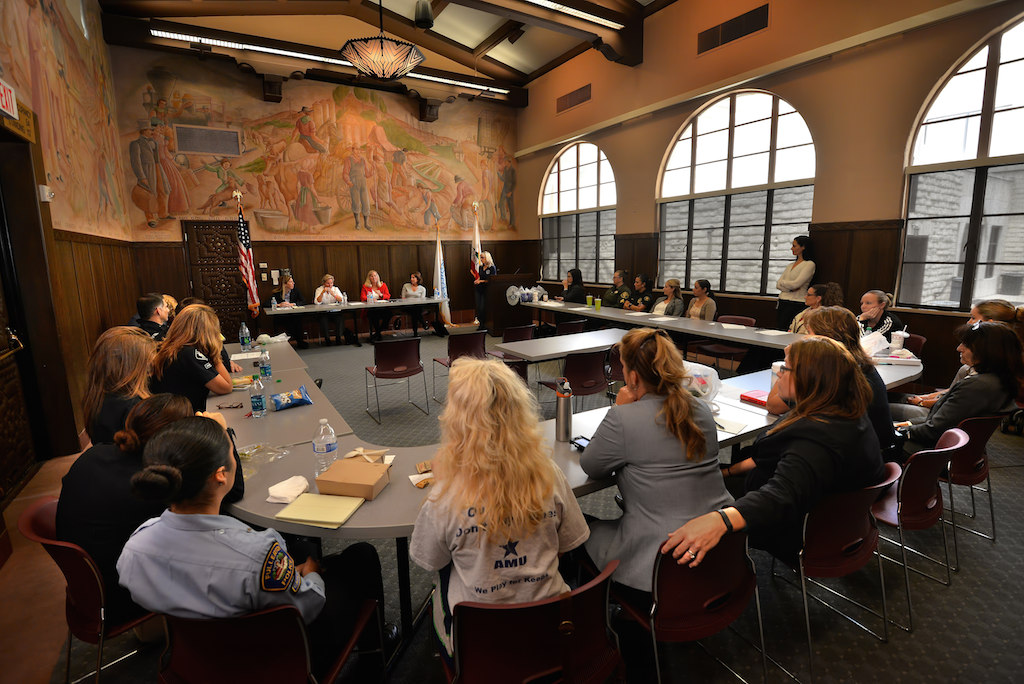
Women Leaders In Law Enforcement (WLLE) panel discussion in the Fullerton Police Department’s Mural Room on May 21. On the panel from left is Lorraine Jones, retired Fullerton Police captain; Sharon Pietrok, retired Anaheim Police lieutenant; Shontel Sherwood, retired Newport Beach Police sergeant; and Jackie Gomez-Whiteley, retired Cypress Police chief.
Photo by Steven Georges/Behind the Badge OC
What I would tell somebody is that the most important thing is your reputation. The relationships you have at the police department is like your family. Once you break that trust, it’s really hard to get it back.
It’s really important to realize that your reputation is you. Your personal life can sometimes get pulled into the PD, and that has resulted in the demise of some people.
Consider your reputation all the time, and always do your work. If you tell someone you’re going to do something, your follow-through is huge.
Jones — I think the thing I would tell myself is that it’s my responsibility to move up in the organization. It took me nine years to get into a one-year training assignment, a specialty, in the detective bureau.
I spent the first three or four years learning to become a cop. Then I started putting in for specialties and wasn’t getting them. I was just waiting for someone to come to me and tell me I got the job.
What I didn’t understand was I needed to take an active role in getting that job. I needed to ask myself, what could I be working on to become a viable candidate the next time there was an opening? But I never did that. I just sat back and waited for it to come to me.
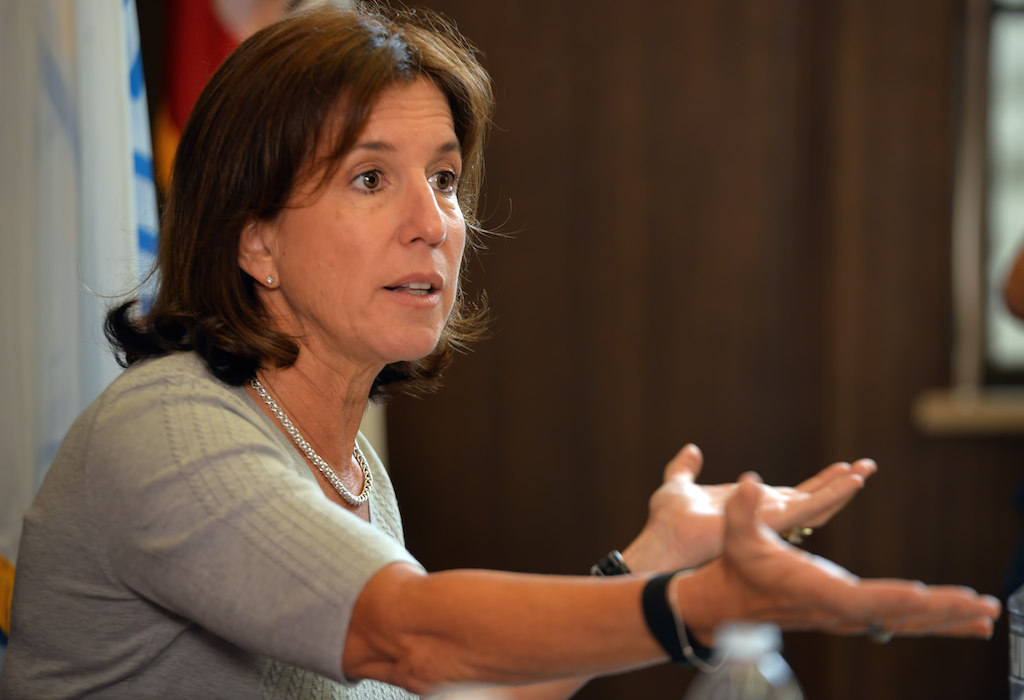
Jackie Gomez-Whiteley, retired Cypress Police chief, advised against putting up “artificial barriers” on yourself.
Photo by Steven Georges/Behind the Badge OC
You’ve got to take ownership of your career and where you want to go. You can make it happen, but you have to talk to people and let them know you’re interested and then ask for their input in what you can do to start learning the skills that will make you successful in your next assignment.
Gomez-Whiteley — Believe in yourself. Be who you are and get all the experience you can. I have a saying: “Just because they say it doesn’t make it so.” And this doesn’t just apply to law enforcement, but to human nature in general.
Did you know that Michael Jordan was cut from the high school basketball team? He went home and cried. But then what did he do? He went and worked harder than everyone else. He didn’t give up.
I went through a lot of pitfalls. Don’t put up an artificial barrier and tell yourself, ‘I can’t be a lieutenant or I can’t work undercover.” You put that artificial barrier there. No one else did. And even if they did, that doesn’t make it so.
Q. Where did you personally find the greatest source of motivation or support or mentoring?
Sherwood: I’ve had some FTOs (field-training officers) who were amazing and they were good to me, and two happened to become captains and took me under their wing throughout their careers.
Jones: For me it was when I went into the training division to do recruiting. I was working for a male lieutenant who called me into his office and sat me down and said, ‘What are you doing with your life? It’s great that you became an officer so young, but you’re kind of bouncing around and waiting for things to happen. You need to get focused. Where do you see yourself ending your career? What are you doing?’
I told him, ‘I don’t know.’
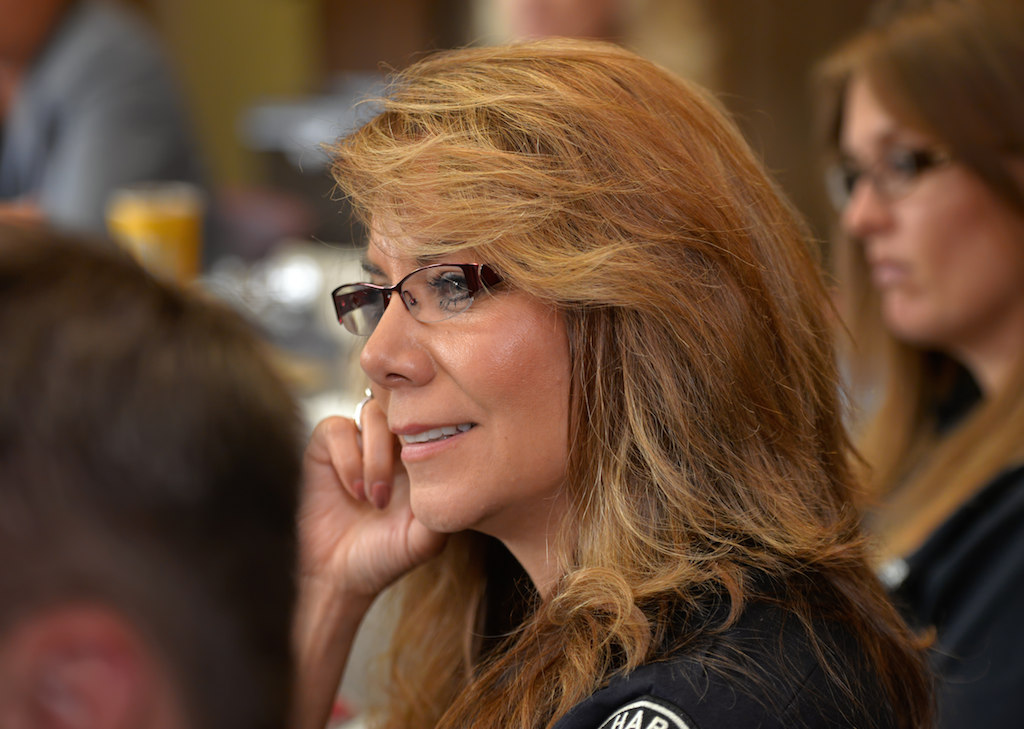
Rita Ramirez, bureau manager for the La Habra PD, listens to a Women Leaders In Law Enforcement (WLLE) Southern California panel discussion at the Fullerton Police Department.
Photo by Steven Georges/Behind the Badge OC
He’s the person who got me thinking that it was time to go back to school and finish that bachelor’s degree that I had stopped because I wanted to be an officer so badly, and he’s the one who got me thinking about actually working with cadets and mentoring them, because I started as a cadet.
You need male mentors and female mentors throughout your career all the time, because there’s something to learn from everybody.
Pietrok: I had two key mentors. The first was somebody I met when I first started. He took me under his wing like one of his kids and taught me the ropes about police work and the things you have to look ahead for.
I came in with a bachelor’s degree, which I think is huge. About the time I was a supervisor I realized that in order to stay ahead of the curve I needed to get my master’s degree. I think that education is key, especially if you want to promote. It also helps your writing skills, which at any point in your career is huge.
My other mentor is from an agency who helped me along the way, and when I was approached to come to the detectives unit, she told me: ‘When someone approaches you, don’t say no. You really just need to do it even if you think you aren’t ready.’
You can get mentored from people throughout the organization, not just from people of a certain rank or gender. Take advantage of those moments, because you don’t get them back.
Gomez-Whiteley: You’ve got to continue to try and learn something new every day. You learn from other people’s experience and wisdom, and their intuition. It’s also important to have mentors outside of law enforcement. A lot of our struggles are universal struggles. Don’t forget to ask people of rank to be your mentor. I asked the sheriff to be my mentor and she said it’s a two-way street. Now, it’s much more of a friendship than it is a mentorship.
Q. Looking back, what would you consider a pivotal moment in your career — where it could have gone either way?
Sherwood: When I first tested for sergeant nine years into my career, it did not go well for me. During those first nine years, I also was a full-time basketball coach at a high school in Costa Mesa. I loved being a cop, but I also really loved coaching. I didn’t put as much time and effort into my (police) job as much as I probably should have.
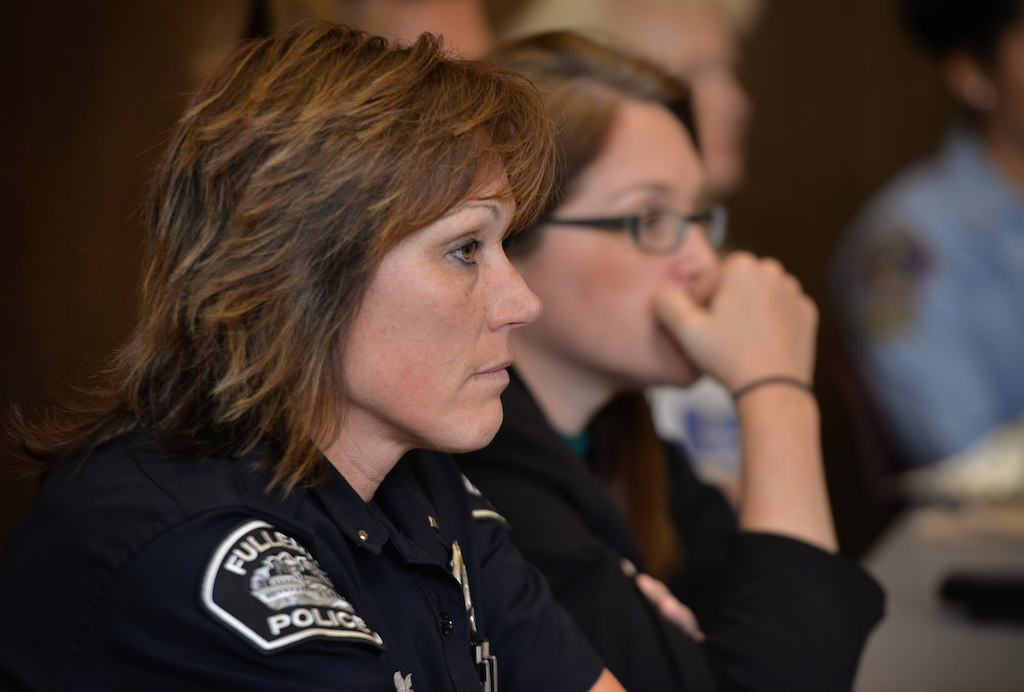
Lt. Rhonda Cleggett of the Fullerton PD, left, listens to the panel discussion.
Photo by Steven Georges/Behind the Badge OC
Things were said about me (on her failed test for sergeant) that I didn’t want to hear. I wasn’t doing anything outside of just going to work. It was then when I realized that if I wanted to do the things I wanted to do in this department, it was up to me.
I was at a crossroads. I made the decision I was going to stop coaching and concentrate on my career. I wanted to show my command staff I was a team player.
I started taking on ancillary duties and took a leadership course and started doing a lot of things within my department in order for people to see I had a focus that I wanted to be a team player and give all to my department and my community.
Pietrok: Becoming a detective really challenged me. That’s how you catch crooks and put them in jail for a very long time. But being a detective really launched me and made me much more successful as a supervisor when I became sergeant, because I could answer most of the questions that came at me, and I knew how to navigate things better.
One thing I would say is never take things personally. If you leave personal things out of it it’s easier to navigate the pitfalls and the high points. Your most favorite four-letter word should be ‘team.’ And you’re not a rank, you’re a person. Remember who that person is. Don’t get lost in the politics and the rank.
Jones: Timing is everything. Some of it is luck, and sometimes your timing won’t align with that of the agency. I tested three or four times before I got lieutenant. Take solace in the fact that it sucks not to be promoted when you test, but that there are great opportunities ahead for you that will prepare you for that next step when you actually are more ready but just don’t know it yet.
Gomez-Whiteley: Taking that from a chief’s perspective, you want the best and most talented people running the organization. When you experience disappointment, no one wants to hear you moan about it. I really think that’s character defining. The easiest thing to do is blame other people. The hardest thing to do is to look in the mirror.
Yes, maybe it was tough to be passed over for promotion, but my thing has always been to outclass, outgrace, and outdignity the competition. Every time I tested and didn’t get a promotion, I was the first one with a smile on my face congratulating the person and not talking bad about them. You can do it. It just takes discipline.
Sherwood: You have to set your pride aside and say, ‘These are the things I need to do if I want to get here or here.’ Pick somebody who isn’t going to tell you everything you want to hear — someone you know is going to tell you the truth, no matter how much it hurts. You never will be successful if you can’t take criticism.
Q. Any parting thoughts?
Gomez-Whiteley: I’ll share with you something I thought when I was a 14-year-old kid, and that they put on my plaque when I retired: ‘Dream it, obtain it, imagine it and become it.’
Sherwood: Don’t blame anyone else. You’re in charge of things.
Pietrok: Part of being successful means always to accept responsibility for your actions. All you have is your own integrity. And always learn from your mistakes.
Jones: Never forget what it felt like when you got the call that you were hired and then when you graduated from the police academy and had your badge pinned. Remember how hard you worked to become a police officer and continue to work hard every day. And lastly, to be successful live by the Golden Rule: Treat others the way you would like to be treated.
 Behind the Badge
Behind the Badge
